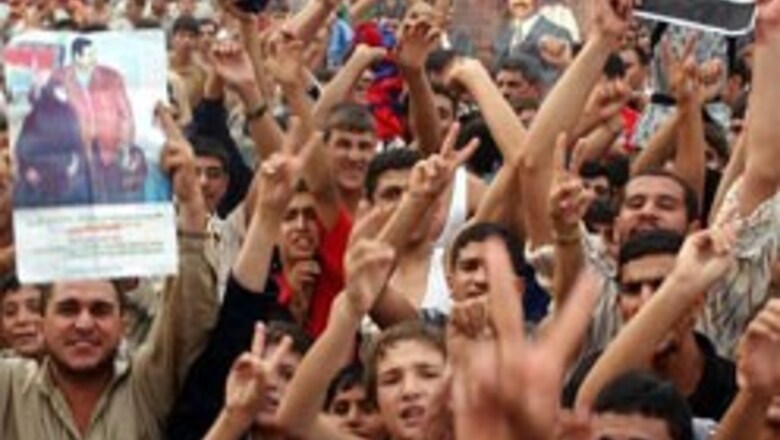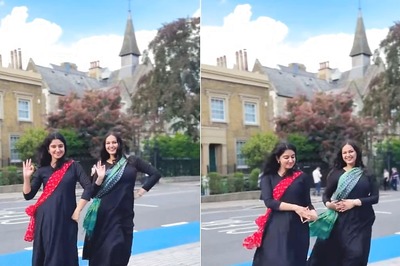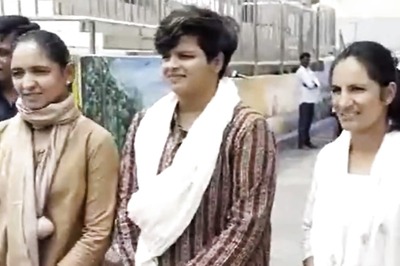
views
Baghdad, Iraq: Many Iraqis reacted with jubilation to Saddam Hussein's death sentence Sunday, while others took to the streets in protest.
The Interior Ministry closed two Sunni satellite TV stations accused of inciting sectarian violence, a ministry official said.
Iraqi police and soldiers ordered the employees of First Channel [Zawra] and Salaheddin TV to leave their offices in Tikrit, Hussein's hometown.
That is where as many as 2,000 people protested Sunday's verdict and sentence against the former Iraqi leader, defying the government's curfew.
Earlier in the day, a witness said the protesters in Tikrit carried posters of the former president and were shooting into the air. The numbers of demonstrators grew after the sentence was announced. There have been no reports of widespread violence, and the measure to close the two TV networks is largely precautionary.
A complete movement ban, both people and vehicles, was imposed on Sunday in the provinces of Baghdad, Diyala and Salaheddin, where Tikrit is located.
Meanwhile, gleeful Iraqis took to the streets in celebration in predominantly Shiite areas, including Baghdad's Sadr City neighborhood, southern towns in Wasit province, and the southern city of Najaf.
Some carried pictures of Muqtada al Sadr's grandfather, a cleric who was murdered by Hussein in the '80s and shot their guns in the air in celebration.
Witnesses said people shouted "the killer deserves to be killed" and set pictures of Hussein on fire.
In the climax to a trial that began more than a year ago, a combative Hussein and two other defendants on Sunday were sentenced to death by hanging for a brutal crackdown in 1982 in the Shiite town of Dujail.
One other defendant was sentenced to life in prison, and three received 15-year sentences. The Dujail case stemmed from a crackdown against townspeople after a 1982 assassination attempt against Hussein in the town.
According to court documents, the military, political and security apparatus in Iraq and Dujail killed, arrested, detained and tortured men, women and children in the town. Homes were demolished and orchards were razed.
Sunday's 50-minute court session was dramatic. Hussein entered with a Quran in hand, as he had in the past. He began shouting Allahu Akhbar (God is great) as the verdict and sentencing was read.
He also argued with the chief judge and shouted, "Damn you and your court." As the judge ordered him taken away, Hussein said to one of the guards,
"Don't push me, boy."
President Bush called the verdict "a milestone in the Iraqi people's efforts to replace the rule of a tyrant with the rule of law."
"It's a major achievement for Iraq's young democracy and its constitutional government," Bush said, speaking on the tarmac at the airport in Waco, Texas, before heading to Nebraska for a campaign event.
The appeal process has now been set in motion.
Within 10 days, the court will forward the cases of Hussein and three other defendants to the appellate chamber of the Iraqi High Tribunal. Appeals of death penalties and life sentences are automatic.
PAGE_BREAK
Within 20 days after the appeals are made, the prosecution and the defense must submit their documents to the appellate chamber.
A court official told The Associated Press the appeals process was likely to take three to four weeks once the formal paperwork was submitted.
However, there is no time limit for the appellate court to rule on the appeal.
Once the court does reach a decision, if the sentences are upheld, they must be carried out in 30 days. Iraqis, not the coalition, would carry out the executions.
"The Saddam Hussein era is in the past now, as was the era of Hitler and Mussolini," said Iraqi Prime Minister Nuri al-Maliki, calling Hussein the worst ruler ever in Iraq.
"We want an Iraq where all Iraqis are equal before the law," he said.
"The policy of discrimination and persecution is over." Barhim Salih, the Kurdish deputy prime minister of Iraq, called this a "historic day."
Many Iraqis wanted "swift" and "summary" justice, Salih said, but Iraq "abided by the legality of the process."
The Iraqi Islamic Party- the country's most powerful Sunni political group- indicated that while justice was served, the present government urgently need to grapple with widespread injustices now.
Sunnis were predominant in Hussein's government and have lost much of their clout since he was toppled. They have been dominant in the insurgency, and critical of the Shiite-led government for not dealing strongly with Shiite death squads.
The group said Iraqis have the right to ask whether crimes being committed today are not unlike the crimes under the Saddam Hussein regime. The group mentioned sectarian killings and displacement and the imprisoning of innocents.
White House spokesman Tony Snow praised the Dujail trial verdict, including Hussein's sentence of death by hanging for crimes against humanity. "It demonstrates that you've got an independent Iraqi judiciary and that they were applying their own laws," Snow said.
World reaction to the verdict was mixed.
Along with Hussein, his half brother and former intelligence chief Barzan Hassan, and former chief judge of the Revolutionary Court Awad Bandar also were sentenced to death.
Taha Yassin Ramadan, a former vice president of Iraq, was sentenced to life in prison.
Mohammed Azzawi Ali, a former Dujail Baath Party official, was acquitted because of insufficient evidence against him, the court said.
The three others-Abdullah Kadhem Ruwaid, Ali Dayem Ali, and Misher Abdullah Ruwaid-were sentenced to 15 years each.
Hussein is also in the middle of another trial involving the 1988 Anfal campaign, the government offensive in the country's Kurdish region. Hussein is charged in that case with genocide.

















Comments
0 comment